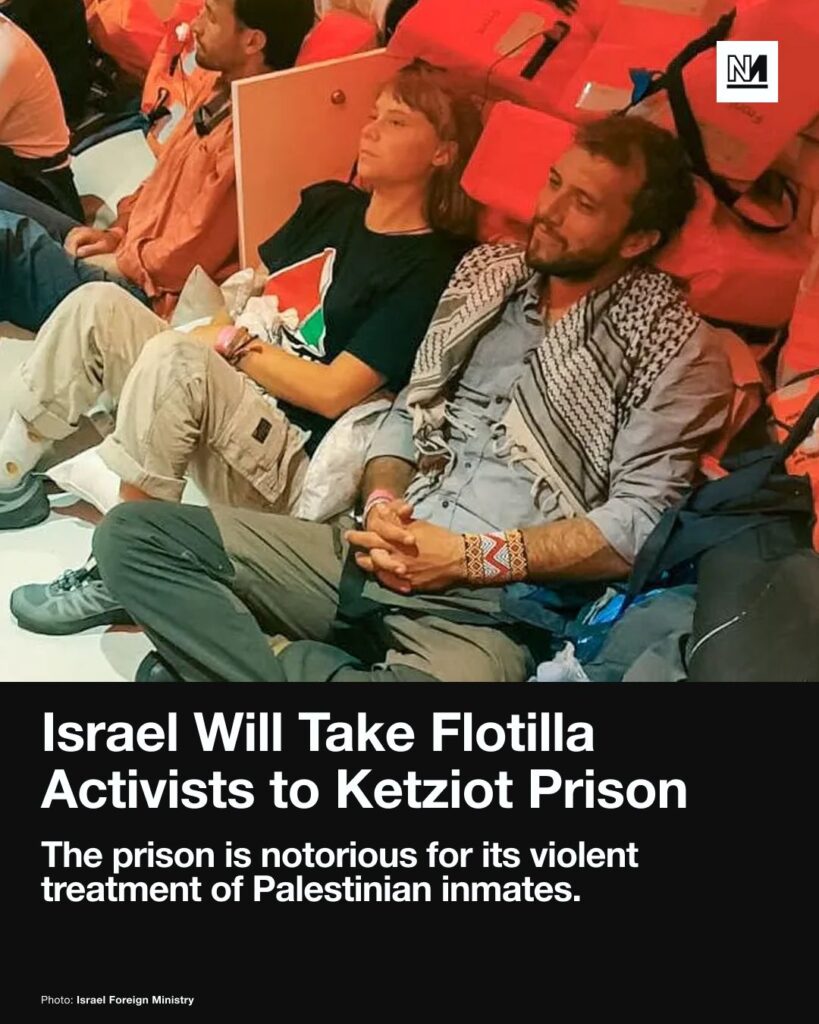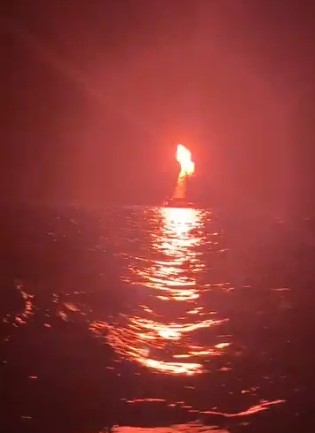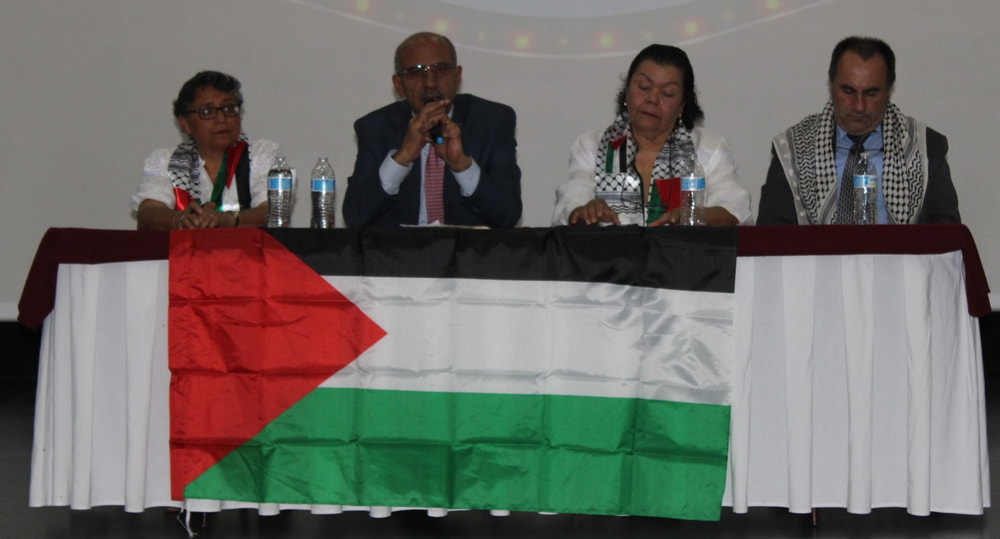
Israel
Noticias de Abajo 25/11/2025
[podcast]https://archive.org/download/noticiasdeabajo_25_11_2025/noticiasdeabajo_25_11_2025.mp3[/podcast]
Rompiendo fronteras:
Bolivia: El presidente Rodrigo Paz elimina el Ministerio de Ambiente y agua, poniendolo bajo control de intereses capitalistas y extractivistas. Colectivos ambientales, académicos y representantes de la sociedad civil boliviana manifiestan su preocupación. Fuente: Mongabay
Israel: No cesa de usar la violencia, bombardeos en Syria, Libano y Gaza contra poblaciones civiles por parte de las Fuerzas de Defensa de Israel, medio oriente bajo la violencia colonial. Fuente: Resumen latinoamericano
Chile: Brutalidad policial en contra de miembros de comunidades Mapuche de Ercilla, sostenido el clima represivo por el Estado Chileno. Fuente: Radio Kurruf
PRESXS POLÍTCOS: Evento por la libertad de Mumia Abu Jamal y en homenaje a Carolina Saldaña, ambos periodistas que luchan por los derechos de todas y todos. Fuente: Amigos de Mumia México
Desde el ombligo del monstruo
OAXACA: Gobierno Estatal de Oaxaca clasifica comunidad perseguida como “Foco Rojo” lo cual pone en riesgo a activistas, comuneras y comuneros organizados por la libertad de sus perseguidos. Fuente: Observatorio Memoria y Libertad
Chiapas: Libres, los cinco defensores tseltales de San Juan Cancuc, presos desde 2022. Cientos de indígenas han pasado por las cárceles de Chiapas por cargos fabricados. Fuente: Desinformemonos
Michoacán: Muere comunera por heridas de bala e indebida atención de hospitales de Michoacán. Roxana Valentín Cárdenas, comunera de San Andrés Tziróndaro, perdió la vida por heridas de bala y una indebida atención en hospitales de Michoacán, luego de que un grupo armado agrediera una movilización de comunidades purépechas por el 46 aniversario de la defensa de la tierra en Santa Fe de la Laguna. Fuente: La Cooperacha, Consejo Supremo Indígena
CDMX, XOCHIMILCO: Amenazas de muerte ponen en alerta a activistas en el sur de la Ciudad, el acoso contra el periodista Max Negrete ha aumentado. Desde el martes 18 de noviembre, el periodista comunitario, Max Emiliano Negrete González, recibió tres mensajes con amenazas de muerte, a través de la red social Instagram, por parte de cuentas recién creadas, sin fotografías de perfil y con nombres que hacen alusión a un daño a la integridad y vida del periodista. Fuente: Articulo 19
FORO INFORMATIVO: LOS PELIGROS DE LA MINERÍA EN LOS PUEBLOS ÑUU SAVI, NAHUA E INGIWA
Los Peligros de la Minería en los pueblos Ñuu Savi, Nahua e Inwiga, busca abrir un espacio de análisis, diálogo y acción colectiva, por lo que nos reuniremos con el objetivo de: Analizar de manera colectiva los impactos sociales, ambientales y culturales de la minería en los territorios de los pueblos Ñuu Savi, Nahua e Ingiwa y construir estrategias conjuntas que fortalezcan su defensa y la continuidad de la vida comunitaria.
ZONA TECNOACRATA
Modelos de lenguaje de Iinteligencia Artificial rechazan nuevos paradigmas y favorecen est status quo, validando discursos que se basan en el consenso y no en la realidad, dicha razón es la causa de respuestas falsas, justificar con argumentos falsos su sostenimiento de la realidad.
Israel y la resistencia palestina acuerdan implementar primera fase del plan de Trump
Por Carlos Fazio (*)
Las delegaciones de Israel y de la resistencia palestina, representada por emisarios político-diplomáticos de Hamás y la Yihad Islámica, llegaron a acuerdos, ayer, 8 de octubre, en el balneario egipcio de Sharm el-Sheij, a orillas del mar Rojo, para implementar la primera fase del plan de 20 puntos propuesto la semana anterior por Donald Trump.
Si se cumplen las condiciones necesarias sobre el terreno (en la Franja de Gaza), el acuerdo permitiría la devolución de algunos rehenes israelíes y el intercambio de prisioneros palestinos. La firma del acuerdo tendrá lugar este jueves en Egipto.
La información, divulgada por Al Mayadeen citando fuentes palestinas, fue confirmada poco después por la corresponsal en la Casa Blanca de News Nation, Kellie Meyer. A su vez, luego de que el secretario de Estado, Marco Rubio, le entregara un papel durante una mesa redonda este miércoles, el presidente Trump hizo una declaración sorpresa: “Acabo de recibir una nota del secretario de Estado, diciendo que estamos muy cerca de un acuerdo en Oriente Medio y que me van a necesitar muy pronto”.
Luego, con su peculiar estilo comunicacional, publicó un mensaje en su cuenta de Truth Social: “Me enorgullece anunciar que Israel y Hamás han firmado la primera fase de nuestro Plan de Paz. Esto significa que todos los rehenes serán liberados muy pronto e Israel retirará sus tropas a una línea acordada como primer paso hacia una paz sólida y duradera. ¡Todas las partes recibirán un trato justo! Este es un gran día para el mundo árabe y musulmán, Israel, todas las naciones vecinas y los Estados Unidos de América, y agradecemos a los mediadores de Qatar, Egipto y Turquía, quienes trabajaron con nosotros para hacer realidad este acontecimiento histórico y sin precedentes. ¡Benditos los constructores de la paz!”
Tras el anuncio, el primer ministro israelí, Benjamín Netanyahu, reiteró su esperanza de que los rehenes regresaran a sus hogares. “Con la ayuda de Dios los traeremos a todos a casa”, expresó en X.
Por su parte, Hamás instó “al presidente Trump, a los países garantes del acuerdo y a varias partes árabes, islámicas e internacionales” a obligar a Israel a implementar plenamente el acuerdo. El movimiento subrayó que “los sacrificios de nuestro pueblo no serán en vano” y que “no abandonaremos los derechos nacionales de nuestro pueblo hasta que se logren la libertad, la independencia y la autodeterminación”.
Majed al Ansari, portavoz de la Cancillería catarí, confirmó el logro: “Los mediadores anunciaron que esta noche se llegó a un acuerdo sobre todos los términos y mecanismos para la implementación de la primera fase del acuerdo de alto el fuego en Gaza, lo que conllevará el fin de la guerra, la liberación de rehenes israelíes y prisioneros palestinos, y la entrada de ayuda humanitaria. Los detalles se anunciarán más adelante”.
La primera fase de las conversaciones iniciadas el lunes 6 se centró en un alto el fuego y un intercambio de prisioneros palestinos por rehenes israelíes. A puerta cerrada y bajo estrictas medidas de seguridad, los negociadores hablaron a través de mediadores, solo unas semanas después de que el régimen sionista de Benjamín Netanyahu intentara asesinar a los principales delegados de Hamás mediante un bombardeo en Doha, Catar.
Tras reunirse con funcionarios de inteligencia egipcios para que garantizaran su seguridad, el principal negociador del Movimiento de Resistencia Islámica de Palestina (Hamás), Khalil al-Hayya, quien sobrevivió al ataque israelí del mes pasado en Doha, participó en las conversaciones. El martes, al-Hayya había pedido “garantías” para que Israel no reanude la agresión, tras el eventual inicio de un acuerdo de paz.
En una entrevista con el canal egipcio Al Qahera TV, el líder político de HAMAS recordó que el régimen israelí no ha cumplido los acuerdos anteriores. Entre ellos, citó la ruptura unilateral del pacto firmado en enero de este año entre las partes, que permitió la liberación de un grupo de retenidos israelíes bajo custodia de la resistencia palestina. Al-Hayya remarcó entonces que Hamás estaba plenamente dispuesto a detener las acciones armadas de forma definitiva, pero dijo que Israel seguía asesinando y aniquilando e incumpliendo los compromisos adquiridos con los mediadores.
Según una fuente palestina citada por la agencia francesa AFP, el intercambio inicial de rehenes israelíes por prisioneros palestinos requerirá varios días, dependiendo de las condiciones sobre el terreno relacionadas con la retirada de las fuerzas de ocupación, el cese de los bombardeos y la suspensión de todo tipo de operaciones aéreas.
La mediación egipcia dijo el miércoles que las discusiones iniciales giraron en torno a las listas de prisioneros palestinos que serán liberados en virtud del acuerdo de intercambio. Entre los nombres mencionados por Hamas figuraban Marwan Barghouti (quien está condenado a cinco cadenas perpetuas en Israel), Ahmed Saadat, Hassan Salama y Abbas al-Sayed.
Según Hispantv, de acuerdo con el llamado “plan de paz” de Trump, Israel liberaría a más de mil 900 presos palestinos, incluidos 250 con sentencias de cadena perpetua, a cambio de los 48 cautivos israelíes, vivos y fallecidos, en un plazo de 72 horas tras el inicio del cese al fuego.
La resistencia palestina no acepta aspectos del plan neocolonial
Ante la campaña de intoxicación desinformativa de los medios hegemónicos occidentales, cabe consignar que Hamás, la Yihad Islámica y otros grupos de la resistencia palestina no han aceptado el plan neocolonial de Estados Unidos e Israel, que, en un intento por reeditar el modelo aplicado por Washington en Afganistán durante casi dos décadas, incluye al británico Tony Blair como gobernador adjunto. Asimismo, afirmaron que no entregarán las armas hasta que se establezca un Estado palestino.
Por su parte, cabe recordar que un día después de negociar el plan de “paz” con Trump en la Casa Blanca, Netanyahu afirmó que las fuerzas israelíes permanecerían en la mayor parte de Gaza. Dijo: “Recuperaremos a todos nuestros rehenes, vivos y en buen estado, mientras el ejército israelí permanecerá en la mayor parte de la Franja de Gaza”.
Pero ese no es el único punto de fricción. Netanyahu también afirmó que nunca permitirá la creación de un Estado palestino, aunque el documento de Trump incluye un apartado sobre “una vía creíble hacia la autodeterminación palestina y la creación de un Estado” si el acuerdo se cumple plenamente.
Según Netanyahu, eso “no está escrito en el acuerdo”, y afirmó que Israel “se opondría firmemente” a tal medida. Insistió en que Trump comparte esa opinión.
Respaldada por su equipo de gobierno, la postura de Netanyahu es inaceptable para los palestinos. Como expresó el líder de la Yihad Islámica Palestina, Ziad al-Najala, “Israel está tratando de imponer, a través de Estados Unidos, lo que no pudo lograr mediante la guerra”.
La táctica de Netanyahu es conocida: públicamente acepta acuerdos para presionar a Hamás e intentar obtener ventajas, mientras que en privado rechaza sus términos más fundamentales.
Buscado por la Corte Penal Internacional (CPI) por crímenes de guerra y contra la humanidad en Gaza, y adicto a la mentira y la perfidia, primer ministro israelí tiene un largo historial de respaldar negociaciones y propuestas de alto al fuego y, al mismo tiempo, emitir declaraciones contradictorias para frustrar cualquier avance.
Familiares de cautivos israelíes, grupos humanitarios e incluso algunos funcionarios del régimen sionista han acusado a Netanyahu de prolongar la guerra por beneficios políticos personales. Aunque esa táctica va más allá de Netanyahu: quien conozca al régimen de Israel sabe que no se le puede confiar. Su historia está marcada por mentiras flagrantes, acuerdos rotos y tácticas manipuladoras para beneficio propio.
La propuesta de 20 puntos de Trump no aborda las causas profundas del prolongado conflicto árabe-israelí: la ocupación territorial propia de un colonialismo de asentamiento y el régimen de apartheid necropolítico que explota y oprime al pueblo palestino.
El acuerdo preliminar, que inicialmente el jefe de la Casa Blanca planteó como un ultimátum a Hamás, so pena de enviar a los insurgentes al “infierno” en caso de no aceptarlo, esboza un orden político que equivale a una administración colonial de Gaza, con un gobierno local subordinado a un llamado “Consejo de la Paz” presidido por el propio Trump e integrado por figuras pro-guerra y controvertidas, como el citado ex primer ministro británico Tony Blair.
El consejo supervisaría la reconstrucción de Gaza, la planificación económica e incluso su transición política durante cinco años, hasta que se considere que una Autoridad Palestina reformada (sic) esté “lista” para asumir el control.
Impulsado en gran medida por el deseo de Trump de convertir Gaza en una especie de “maravilla” al estilo Dubái, el plan se asemeja a un protectorado del siglo XXI: una zona despojada de soberanía y reconstruida de acuerdo con las prioridades de potencias hegemónicas extranjeras y megamillonarios inversores privados.
Según el proyecto, la reconstrucción de Gaza estaría impulsada por lo que se denomina el Plan de Desarrollo Económico de Trump, inspirado en las relucientes ciudades modernistas del Golfo Pérsico. Una zona económica especial ofrecería aranceles preferenciales e incentivos a la inversión, mientras que un panel de expertos diseñaría un modelo de “gobernanza moderna y eficiente” destinado a atraer capital.
Aunque el plan asegura que “nadie será forzado a abandonar Gaza”, la visión públicamente reiterada de Trump para Gaza se basa en el desplazamiento forzado de su población originaria. Cuantos más palestinos sean removidos por la fuerza de sus tierras, más barato será implementar el proyecto. The Washington Post estimó que se ahorrarían 23 mil dólares por cada palestino que se traslade al exterior. Esto equivale a medio millón de dólares en ahorros por cada uno por ciento de la población de Gaza que se reubique.
Lavrov, sobre Gaza: el plan de Trump es ‘lo mejor que hay sobre la mesa’
En ese sentido, este miércoles, tras describir la crisis humanitaria en la Franja de Gaza como catastrófica, el ministro de Relaciones Exteriores de Rusia, Serguéi Lavrov, dijo que mientras se escuchan “ideas exóticas” como la reubicación de los residentes palestinos en el exterior o la creación de un balneario recreativo en el enclave, los países árabes “se manifestaron categóricamente en contra de eso”.
Mencionó, en particular, a Egipto y Jordania, los vecinos más cercanos de Palestina, en donde, dijo, “nuestros colegas estadounidenses querían reubicar a la mayoría de los residentes gazatíes”. “Ante ese rechazo, (los israelíes) se pusieron a buscar destinos para la reubicación en otras partes del mundo: Se mencionaba Somalilandia, Indonesia, Sudán del Sur, pero me parece que ahora todos entendieron que esto sería una catástrofe no sólo para los palestinos, en el sentido humanitario, sino una catástrofe para la autoridad de la ONU, que proclamó el Estado palestino junto al Estado de Israel ya en 1947”.
Lavrov señaló que, asumiendo toda la complejidad que supone la tarea de poner fin a las hostilidades, en opinión del gobierno de Rusia, el plan propuesto por el presidente Donald Trump, es, a su vez, “un paso positivo”.
“Teniendo en cuenta la necesidad de detener el derramamiento de sangre, salvar las vidas de las personas, reconstruir la Franja de Gaza y la ciudad de Gaza o lo que queda de ello, Trump propuso sus 20 puntos en los que figura la palabra ‘Estado’, aunque todo está formulado en términos bastante generales”, indicó el canciller ruso.
“Sin embargo, somos realistas. Entendemos que esto es probablemente lo mejor que hay sobre la mesa. Al menos lo mejor desde el punto de vista de ser aceptable para los árabes y no ser rechazado por Israel”, reconoció el jefe de la diplomacia moscovita, quien concluyó que “lo más importante, por supuesto, es que sea aceptable para los palestinos”.
“Sin duda, es muy importante cesar todas las acciones militares, y el hecho de que Hamás haga hincapié en las garantías de no repetición de los ataques y de no reanudación de las operaciones militares en la Franja de Gaza -y sobre todo en la ciudad de Gaza- refleja que sacan conclusiones de la experiencia previa a la situación actual”, expresó Lavrov.
“Les deseamos éxito. Si podemos ayudarlos en algo, por supuesto que lo haremos. El presidente Putin dijo muy claramente en el foro de Valdái que obviamente quisiéramos ayudar a crear el Estado palestino, pero hay que empezar con algo”.
¿Se acerca el colapso de Netanyahu?
Al cierre de esta edición de Mate Amargo, medios israelíes señalaron que el ejército de ocupación habían completado la mayor parte de los preparativos para recibir a los rehenes en poder de Hamás, tanto vivos como muertos, en el campamento de Reim, en el sur del país. Los trabajos habían incluido la organización de las instalaciones, del equipo personal, la infraestructura de higiene, la actualización de las órdenes y procedimientos y la preparación de los trabajadores para el proceso de recepción.
Por otra parte, un despacho de Hispantv dio cuenta, ayer, que líderes de la oposición de Israel coordinan esfuerzos para destituir al primer ministro Netanyahu en una próxima sesión parlamentaria. Según el medio árabe, los seis principales líderes del autodenominado “bloque del cambio”, anunciaron haber alcanzado un acuerdo para derribar el gabinete de Benjamín Netanyahu, a quien consideran el principal obstáculo para alcanzar un acuerdo que ponga fin a la guerra en Gaza.
A su vez, el sitio hebreo Ynet detalló que la cita analizó la coordinación de pasos para desalojar al gobierno en la próxima sesión parlamentaria del invierno. En el encuentro estuvieron presentes figuras clave como Yair Lapid, Avigdor Lieberman, Benny Gantz y Naftali Bennett. Los seis líderes acordaron consolidar sus relaciones y apoyar el plan del presidente Donald Trump, y coordinar acciones concretas orientadas a la caída del Ejecutivo actual.
En este sentido, el jefe de la oposición israelí, Yair Lapid, confirmó que la reunión buscaba armonizar los esfuerzos para lograr el derribamiento del gabinete de Netanyahu.
Líderes de la oposición israelí han advertido reiteradamente que las políticas de Netanyahu en Gaza y su gestión de los recursos financieros están acelerando una crisis política sin precedentes. Figuras como Yair Lapid y Benny Gantz han señalado que la combinación del manejo bélico y las dificultades económicas podría precipitar el colapso del actual gobierno, en medio de lo que califican como “una horrible crisis de seguridad, política y económica” que afecta al régimen.

En la imagen, Khalil al-Hayya, líder de Hamás y jefe de la delegación negociadora palestina, revisa los mapas que detallan la retirada del ejército israelí de la Franja de Gaza con Mohammed al-Hindi, subjefe de la Jihad Isámica y Jamir Mezher de las PFLP durante las pláticas de paz con Israel. Foto de prensa de Hamás.
(*) Carlos Fazio, escritor, periodista y académico uruguayo residente en México. Doctor Honoris Causa de la Universidad Michoacana de San Nicolás de Hidalgo. Autor de diversos libros y publicaciones.
Foto de portada de Abdallah F.s Allatar/Anadolu






